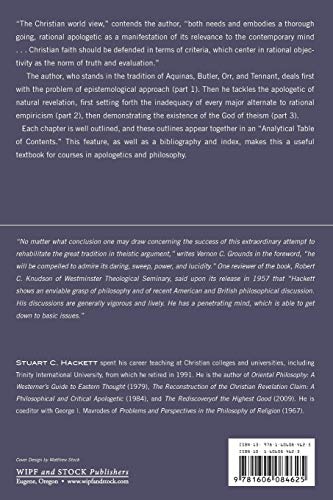Customer Services
Copyright © 2025 Desertcart Holdings Limited




The Resurrection of Theism: Prolegomena to Christian Apology
R**D
A Work of Genius
This is, without question, one of the finest books of Christian philosophy and apologetics that I have ever had the pleasure of reading. Hackett's logic is absolutely sound. The one thing that is difficult to understand, is why this book is not received more recognition and acclaim. I have read numerous works of philosophy, apologetics, theology and Christian thought, but I've never run across anything to equal the sheer power and confidence of this work.Certainly it is not an easy book to read. It requires study, and concentration. But any effort that is expended on going through this work is amply repaid by the sheer pleasure of reading and studying such an important work and Christian philosophy and apologetics. I only wish that I had become acquainted with this work even earlier in my life.My next project is to read everything I possibly can by Stuart Hackett. This man is a true philosophic genius, as well as a highly intelligent and deeply dedicated Christian thinker. I'm truly grateful to Stuart Hackett for composing such an important work.
D**W
The Definitive Refutation of Kant
Christian theology, such as the masterpiece of Aquinas, has begun its work with arguments for the existence of God. David Hume and Immanuel Kant put a stop to that, arguing that the knowledge gained by sense experience can never give rise to reasons for belief in God. This spell hung over philosophy until the middle of the twentieth century, when philosophers like Alvin Plantinga and Stuart Hackett began to fight back.This book is pretty heavy reading, not for the novice. Stuart Hackett systematically picks apart the critiques of Hume and Kant. After lifting Kant's spell on whether we can know things about God, he then proceeds to give arguments for the existence of God, performing one reductio ad absurdum after another on each and every objection raised.This book is a tour de force on the existence of God, demolishing everything that stands in its way.
R**S
Five Stars
Wonderful read and a delight to spend time with...
D**N
Rigorous presentation of Christian apologetics
I first encountered Stuart Hackett a half century ago when I was a freshman at Wheaton College and he was a professor of philosophy. His lectures were detailed and full of intellectual rigor, some of which was beyond my intellectual capacity at the time. Eventually I chose to follow his example and embarked on a career as a philosophy teacher. One of the books we read in his introductory ethics course was his "The Resurrection of Theism." Although I didn't fully understand it at the time I was impressed with the intricacy and depth of his arguments, as one by one he dissected and destroyed the arguments against Christian theism. Clearly this was not a book for casual bedtime reading. It was only years later, when I was better equipped to follow his arguments that I came to a full appreciation of what he had done in this book. And even then I often had to go back and reread a passage to really understand it. So, someone looking for a brief overview of Christian apologetics had best look elsewhere. However, for the person willing to persevere, Hackett's book will give that person a far greater understanding of what is wrong with the skepticism of writers such as David Hume, the attacks on the arguments for the existence of God by Immanuel Kant and others, as well as the problems inherent in all forms of subjectivism (including and especially logical positivism), and why, in the end, only a system founded upon the rock-solid base of the revelation of God will survive intact.
D**N
For the serious student
I first became aware of "The Resurrection of Theism" the first semester my freshman year at Wheaton College in the early 1960s. Stuart Hackett, who was a relatively young man at the time, was our teacher. He was as rigorous an instructor in class as he was in his writing. And he expected philosophical rigor of his students, so much so that I, as an overwhelmed freshman, quickly switched my major to history. Thankfully, I found my way back to philosophy and when, during my senior year, I took philosophy of religion from Dr. Hackett, I was far more prepared for his lectures.The rigor found in his lectures is in even greater evidence in "The Resurrection of Theism." This is not a book for casual reading while watching a baseball game on television. The book requires one's undivided attention and must be read slowly and carefully. Each paragraph serves to materially advance the argument Hackett is presenting. However, if one sticks with it to the end one will have a far greater understanding, not just of what is wrong with the so-called refutations by David Hume, Immanuel Kant, and others of the arguments for the existence of God, but of the approach to philosophy of all forms of subjectivism, particularly logical positivism, as well as the well-meaning but ultimately failing fideism of Kierkegaard and others.
Z**L
A Classic God Debate Book
Hackett's book The Resurrection of Theism offers a cogent take on rationality and means to knowledge, as well as gives various elements for two different major types of arguments. Consequently, it is little wonder after reading this book that William Lane Craig's Kalam Cosmological Argument and Roger Wasson's Criterial Argument find some of their roots in this powerhouse of a book. Even though the Hackett-Craig Kalam Cosmological Argument has since then fallen on hard times and arguably needs to be more modest than Craig's presentation in order to successfully arrive at supernaturalism, The Resurrection of Theism still stands as an important book in the history of the God debate.
Trustpilot
1 month ago
2 months ago